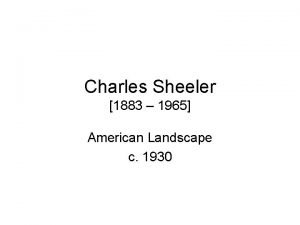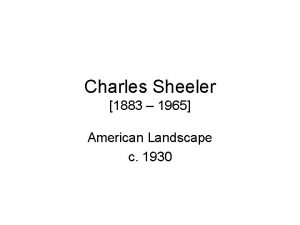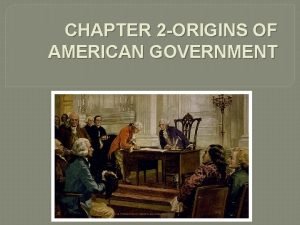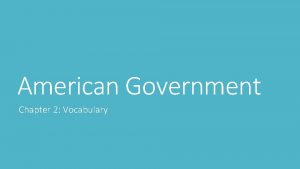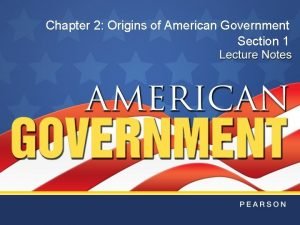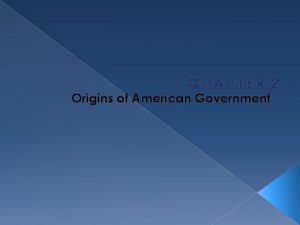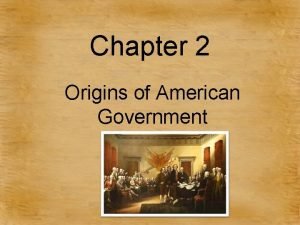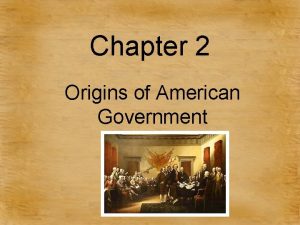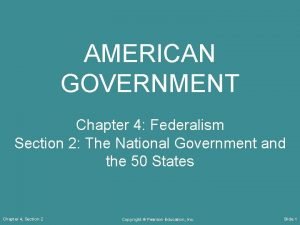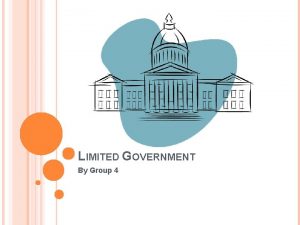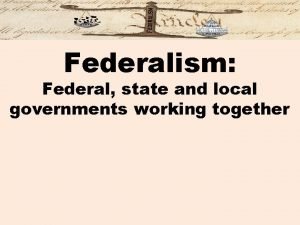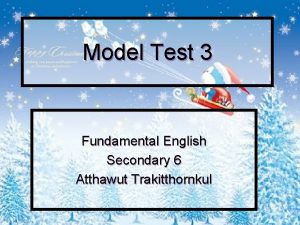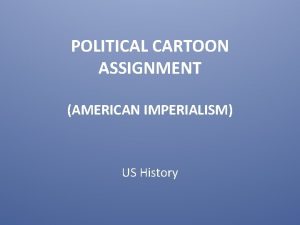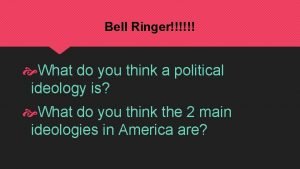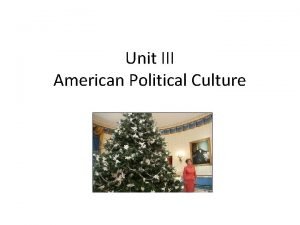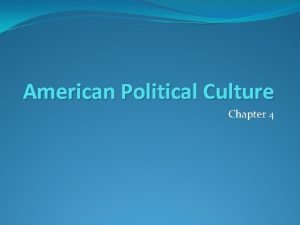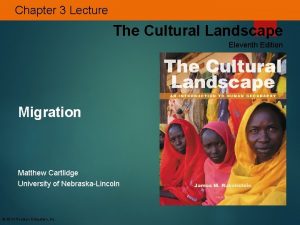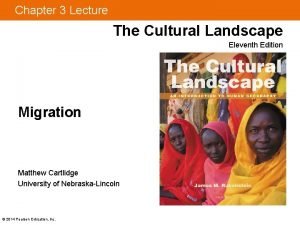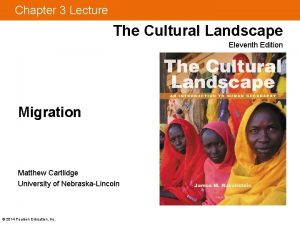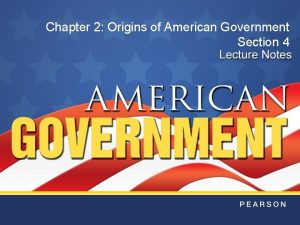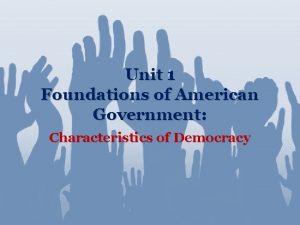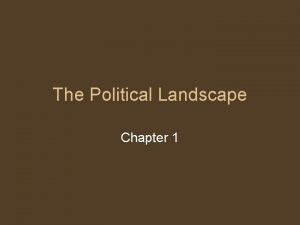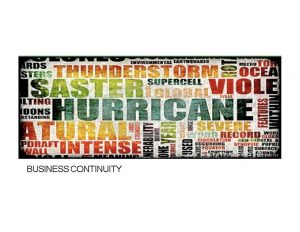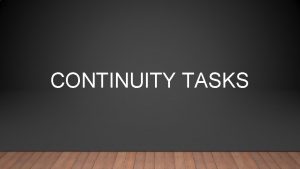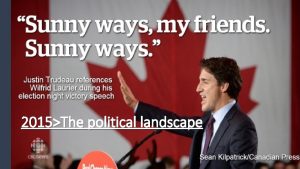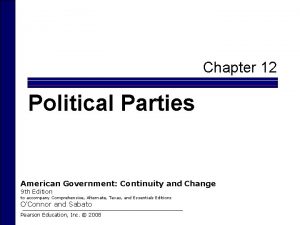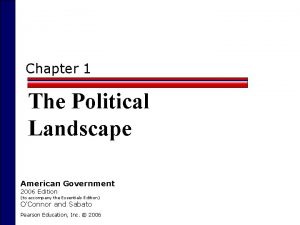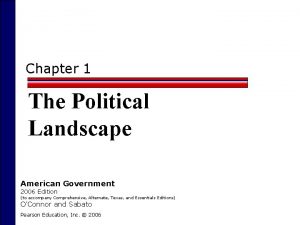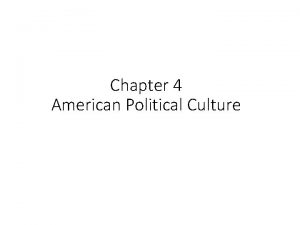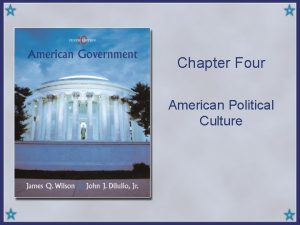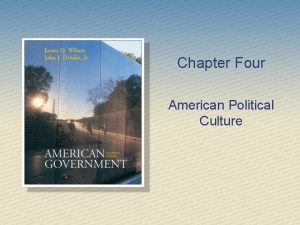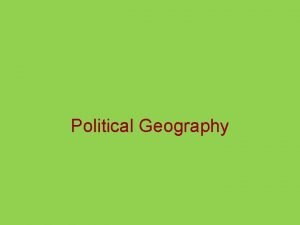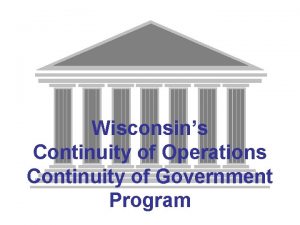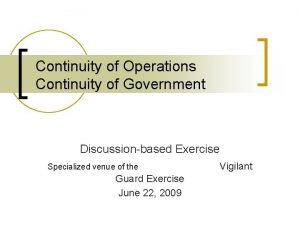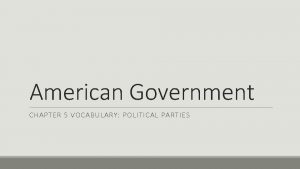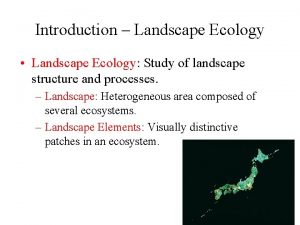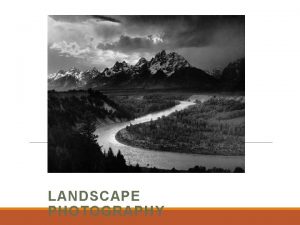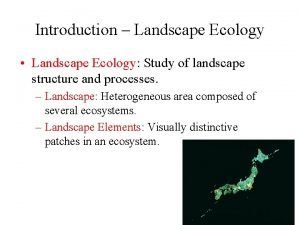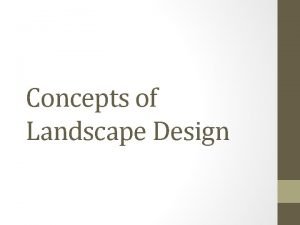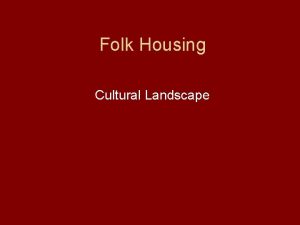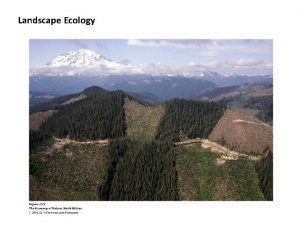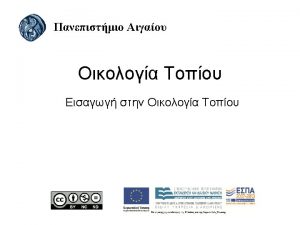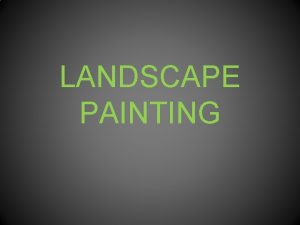Chapter 1 The Political Landscape American Government Continuity

























- Slides: 25

Chapter 1 The Political Landscape American Government: Continuity and Change 9 th Edition (to accompany Comprehensive, Alternate, Texas, and Essentials Editions) O’Connor and Sabato Pearson Education, Inc. © 2008


Government: What It Is & Why We Need It o Governments n The formal vehicle through which policies are made and affairs of state are conducted n Actions are binding on its citizens o Citizens o Members of the political community o Rights and obligations attached to them n Politics o Study of who gets what, when, and how o How policy decisions are made

Functions of Government o o o Establishing Justice Ensuring Domestic Tranquility Providing for the Common Defense Promoting the General Welfare Securing the Blessings of Liberty

Types of Government o Monarchy n Power vested in hereditary kings and queens o Totalitarianism n Economic system in which government controls the economy o Oligarchy n Form of government in which the right to participate is conditioned on the possession of wealth, social status, military position, or achievement o Democracy n System of government that gives power to the people, whether directly or through elected representatives


Roots of American Government o The Reformation and the Enlightenment n Enlightenment: Philosophers and scientists such as Sir Isaac Newton questioned fate and divine right of kings. n Reformation: Radical Protestants split from the Church of England. o Protestants and Puritans believed in the ability to speak directly to God. o Pilgrims: established self-governing congregations n Mayflower Compact- a social contract § An agreement between people and their government, signifying consent to be governed

Hobbes, Locke, and a Social Contract Theory of Government o Argued that individuals were free and equal by God-given natural right o n n This required that all men and women give their consent to be governed. Hobbes argued that man’s natural state was war and without government life would be “solitary, poor, nasty, brutish and short”; a struggle to survive. Therefore, there is a need for a single, strong ruler to guarantee the rights of the weak against the strong. Locke took the basic survival of humanity for granted. o Government is necessary to preserve private property. o Denied divine right o Individuals born equal and with natural rights no king had the right to void

Devising a National Government in the American Colonies o Colonists rejected system with strong ruler o Supported more participatory forms o Direct democracy n Members of the polity meet to discuss all policy decisions and then agree to abide by majority rule. o Indirect democracy (representative) n Gives citizens the opportunity to vote for representations who will work on their behalf n Republic o Rooted in the consent of the governed; representative or indirect democracy

American Political Culture & the Characteristics of American Democracy o Political Culture n n Commonly shared attitudes, beliefs, and core values about how government should operate American political culture emphasizes: o Personal Liberty o Equality o Popular Consent n The idea that governments must draw their powers from the consent of the governed o Majority Rule n Central premise of direct democracy in which only policies that collectively garner the support of a majority of voters will be made into law o Popular Sovereignty n Right of the majority to govern themselves based on natural law (ethical principles that are part of nature and understood by reason)

American Political Culture o Civil Society n A society created when citizens are allowed to organize and express their views publicly as they engage in open debate about public policy. o Individualism n Important political value n Concept changed over time o Religious Faith n Lens through which many Americans perceive policy and political issues n Most Americans have strong religious beliefs. n Overwhelmingly Christian n Major role in shaping current political agenda

Changing Characteristics of the American People o Size and Population n Growth both in size and population o Changing Demographics n Racial and Ethic Composition o Immigration has changed the nation. o Racial balance is changing dramatically today. n Proportion of Hispanics growing at the quickest rate n 40% of Americans under the age of 25 are members of a minority group.



Changing Characteristics of the American People o Changes in Age Cohort Composition n No longer nation of young n Average life expectancy: women: 80, men: 75 o Types of services and policies demanded from government change o Baby Boomers (born in late 1940 s-early 60 s) o 76. 8 million people n Will reach age 62 and qualify for Social Security in 2011 and at age 65 qualify for Medicare n Potential political impact? Will pit young against old.


Changing Characteristics of the American People o Changes in Family and Family Size n Large families were the norm and gender roles were clearly defined. n Industrialization and knowledge of birth control methods began to shrink family size. o 1949 -49% said 4 or more children was an ideal family size o 2004 -only 12% favored large families o By 2004, 67. 8 percent of children under 18 lived with both parents.

Implications of These Changes o Debate over illegal immigration o History of debate on immigration o Demographic changes led to us vs. them mentality for some

Ideology of the American Public o Political Ideology n A set or system of beliefs that shapes the thinking of n individual and how they view the world Perform four key functions: o Explanation, Evaluation, Orientation, Political Program o Libertarian n o Favors a free market economy and no governmental interference in personal liberties Conservative n A government is best that governs least; a big government can only infringe on individual, personal, and economic rights. o Social conservative n Believes that traditional moral teachings should be supported and furthered by the government



Ideology of the American Public o Liberal n Favors extensive governmental involvement in the economy and the provision of social services; takes an activist role in protecting rights of women, elderly, minorities, and the environment o Problems with Political Labels n May not predict political opinions n Often opinions are mixed; conservative on some issues, liberal on others n Cut across ideological boundaries n Most people prefer to be categorized as moderates.


Current Attitudes Toward American Government o Americans’ views about and expectations of government affect the political system. n n High expectations Do not appreciate the good Mistrust politicians Voter apathy o Redefining our Expectations

 Absolute continuity implies uniform continuity
Absolute continuity implies uniform continuity Charles sheeler american landscape
Charles sheeler american landscape Charles sheeler american landscape
Charles sheeler american landscape Chapter 2 american government
Chapter 2 american government Origins of american government vocabulary
Origins of american government vocabulary Chapter 2 origins of american government answer key
Chapter 2 origins of american government answer key Chapter 2 origins of american government worksheet answers
Chapter 2 origins of american government worksheet answers Chapter 2 lesson 1 origins of american government
Chapter 2 lesson 1 origins of american government Chapter 2 origins of american government
Chapter 2 origins of american government American government chapter 4
American government chapter 4 Limited government definition
Limited government definition Political ideology definition ap gov
Political ideology definition ap gov State and federal constitutions
State and federal constitutions If a ruby is heated it temporarily lose its color
If a ruby is heated it temporarily lose its color American imperialism political cartoons explained
American imperialism political cartoons explained U.s. imperialism political cartoons
U.s. imperialism political cartoons American political spectrum
American political spectrum American political culture definition
American political culture definition American political culture definition
American political culture definition The cultural landscape chapter 3
The cultural landscape chapter 3 The cultural landscape chapter 3
The cultural landscape chapter 3 The cultural landscape chapter 3
The cultural landscape chapter 3 Origins of american government section 4
Origins of american government section 4 Government study guide unit 1
Government study guide unit 1 Unit 1 foundations of american government
Unit 1 foundations of american government Origins of american government section 1
Origins of american government section 1

